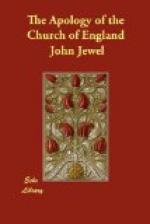And yet, for all those Fathers had such malicious and stiff-necked enemies, yet if they had come they should have had free speech at least in the councils. But now, sithence, none of us may be suffered so much as to sit, or once to be seen in these men’s meetings, much less suffered to speak freely our mind; and seeing the Pope’s legates, patriarchs, archbishops, bishops, and abbots—all being conspired together, all linked together in one kind of fault, and all bound by one oath—sit alone by themselves, and have power alone to give their consent: and, at last, when they have all done—as though they had done nothing—bring all their opinions to be judged at the will and pleasure of the Pope, being but one man, to the end he may pronounce his own sentence of himself, who ought rather to have answered to his complaint; sithence, also, the same ancient and Christian liberty, which of all right should specially be in Christian councils, is now utterly taken away from the council—for these causes, I say, wise and good men ought not to marvel at this day, though we do the like now, that they see was done in times past in like case of so many Fathers and Catholic bishops: which is, though we choose rather to sit at home, and leave our whole cause to God, than to journey thither, whereas we neither shall have place nor be able to do any good; whereas we can obtain no audience; whereas princes’ ambassadors be but used as mocking-stocks; and whereas, also, we be condemned already, before trial, as though the matter were aforehand despatched and agreed upon. Nevertheless, we can bear patiently and quietly our own private wrongs. But wherefore do they shut out Christian kings and good princes from their convocation? Why do they so uncourteously, or with such spite, leave them out, and—as though they were not either Christian men, or else could not judge—will not have them made acquainted with the cause of Christian religion, nor understand the state of their own Churches?
Or if the said kings and princes happen to intermeddle in such matters, and take upon them to do that they may do, that they be commanded to do, and ought of duty to do, and the same things that we know both David and Solomon and other good princes have done, that is, if they—whilst the Pope and his prelates slug and sleep, or else mischievously withstand them—do bridle the priests’ sensuality, and drive them to do their duty, and keep them still to it; if they do overthrow idols, if they take away superstition, and set up again the true worshipping of God—why do they by-and-by make an outcry upon them, that such princes trouble all, and press by violence into another body’s office, and do thereby wickedly and malapertly? What Scripture hath at any time forbidden a Christian prince to be made privy to such causes? Who but themselves alone made ever any such law?




